Tour Du Monde
by M. Faust
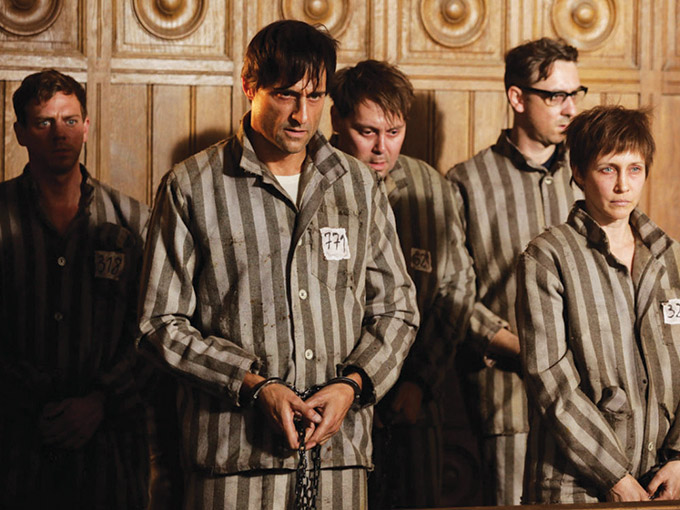
Montreal Festival features culturally diverse cinema
Will this be the last year for the Montreal World Film Festival? God forbid. There are those in Quebec who have been announcing its demise for awhile, but the hue and cry was especially loud this year. The MWFF has lost most of its public funding, in a city that prides itself on its public festivals, for reasons I won’t attempt to go into here. (Let’s just say that the pugnaciousness so many Québécois display toward the rest of Canada can just as often be directed at each other.)
Unlike the Hollywood launching pad for the next crop of Oscar hopefuls that the Toronto Film Festival has largely (if not entirely) become, Montreal remains what a film festival ought to be, a showcase for films from around the world that North Americans probably wouldn’t otherwise get to see. It concentrates less on movies made for international distribution than on those made for viewers in their home countries. As such they provide a much better reflection of different cultures as they see themselves, which more than makes up for the occasional reference that goes over your head.
I still have a few more days to spend here, and hope to be returning next year. Some of the best of what I’ve seen so far:
CLOSER TO THE MOON—Real life and the movies feed on each other in fascinating ways in this drama based on an actual event: In Bucharest in 1959 five former members of the wartime Resistance robbed an armored car by pretending to be making a movie. The Communist government captured them and sentenced them to death, but first had them re-create their robbery for a propaganda film showing the evils of their ways (all were Jews). And why not? This government was already in the business of deciding what was and wasn’t real for its population. The motivation concocted for the thieves by writer-director Nae Caranfil’s screenplay isn’t entirely persuasive, but the movie is smartly structured and handsomely produced. An international co-production starring Vera Farmiga and Mark Strong, it has a fair chance of getting US distribution.

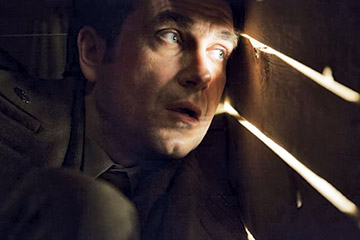
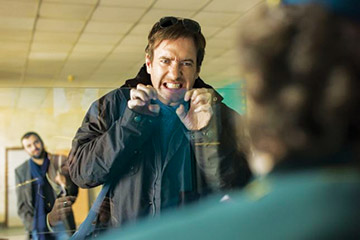
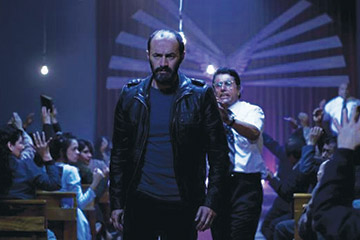
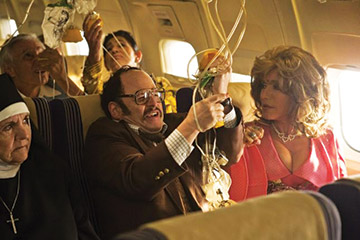
LA MAFIA UCCIDE SOLO D’ESTATE (THE MAFIA KILLS ONLY IN SUMMER)—For most of its running time, this debut feature by Perfrancesco Diliberto, the host of a popular Italian MTV program. plays as a pleasant nostalgic comedy. It follows the a boy growing up in Palermo in the 1970s and 80s whose every milestone seems connected to that Sicilian city’s domination by the Mafia. The ending makes clear (as was doubtless true throughout to Italian viewers) that the filmmaker’s real intention has been to memorialize those who died fighting the mob, and it’s unexpectedly moving. In a post-screening Q&A, Diliberto said that the film came out of his attempts as a Sicilian to dispel his northern Italian friends’ clichéd image of the Mafia, derived from old movies: the real thing may not be as physically dangerous as it once was, but it’s not much less pervasive. Not for nothing has the president of the Italian Senate called it the best film work on Mafia ever made.
JACK STRONG—If the success of A Most Wanted Man shows that the spy movie is still a viable genre, some smart distributor should pick up this Polish film for American release. It tells the true story of Col. Ryszard Kuklinski, a career officer serving on the General Staff of the Polish Armed Forces who in the 1970s served as a CIA “asset,” transmitting 42,000 pages of secret Soviet information. Though he is still considered a traitor by some Polish factions, Kuklinski was motivated by a Russian arms buildup that he felt put his homeland at particular risk. Even if geopolitics aren’t your field, it’s an exciting thriller with a nail-biting final half hour. (Trivia: Patrick Wilson co-stars as Kuklinski’s CIA handler David Forden, who was born in Buffalo and attended East Aurora High School.)
LOST IN KARASTAN—This bone-dry British comedy about Emil Forester, in which a blocked filmmaker (Matthew Macfadyen) accepts an invitation to a film festival in a small central Asian republic, was inspired by actual events in the careers of director Ben Hopkins and his friend Pawel Pawlikowski (whose Ida recently enjoyed an extended run in Buffalo theaters). That presumably does not extend to the part where our hero is hired by Karastan’s dictator to film his country’s national epic, a project that only Emil takes at face value. And I doubt that either Hopkins or Pawlikowski has ever made a film whose tag line (per one of Emil’s posters) calls it “electroshock therapy for the cinematically brain-dead empire.” You have to love filmmakers making fun of their own inability to recognize reality when a camera gets in the way.
PERRO GUARDIAN (GUARD DOG)—The long shadow of Taxi Driver hangs over this drama from Peru about a former paramilitary hitman who now works for veiled forces targeting those who have evaded the law. The morality of the character is unclear, as much to himself as to audiences both local and international: Peru’s struggles with insurgencies and overreaching government anti-terrorism campaigns (under President Alberto Fujimori) leave it a country wrestling with its recent past. Aside from its ambiguities, the film’s rundown cityscapes and unsettling industrial score, and the unblinking performance of Carlos Alcantara as a mass murderer dancing with redemption make it a gripping experience.
And one not so good, unfortunately the only American fiction feature in the festival:
LUCKY STIFF—In order in inherit a fortune, a young man has to take his uncle’s corpse on a wild weekend in Monte Carlo in this homage to 1960s Broadway musicals. First staged theatrically in 1988, Lucky Stiff was adapted to film by Christopher Ashley, who knows something about musicals, having shepherded the Broadway productions of Memphis and Xanadu. But he doesn’t seem to recognize the differences between staging for the theater and for movies. The performers perpetually play to the back row, even in the most minor songs. The songs feel like parodies of show tunes, all rushing to get to their peaks. And at a mere 78 minutes the movie is almost all songs, ignoring the need to give the audience some breathing room between showstoppers. Hey, has anyone ever thought of turning Weekend at Bernies into a Broadway musical?
|
Issue Navigation> Issue Index > v13n35 (Week of Thursday, August 28) > Tour Du Monde This Week's Issue • Artvoice Daily • Artvoice TV • Events Calendar • Classifieds |









 Current Issue
Current Issue